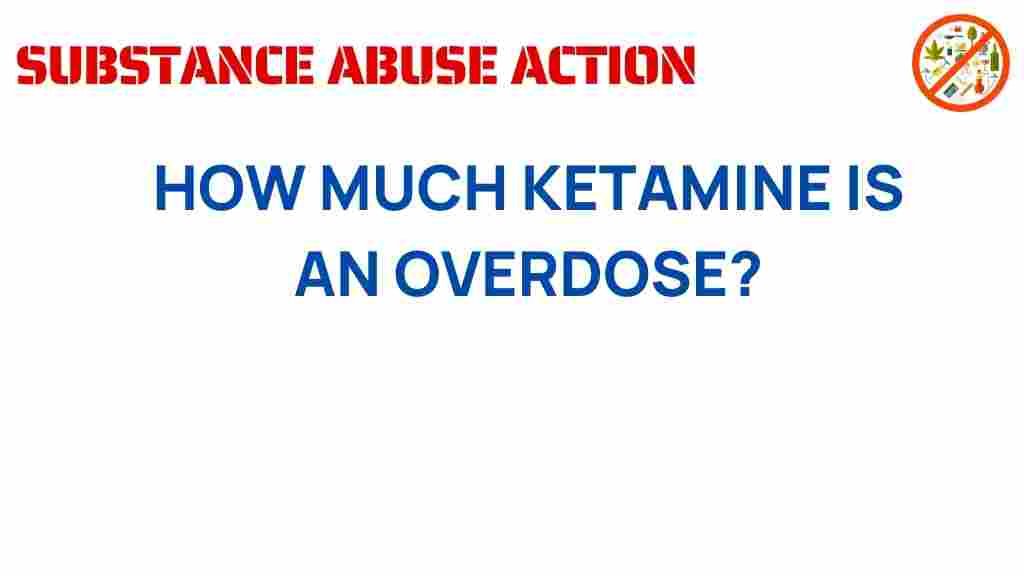The Fine Line: How Much Ketamine Constitutes an Overdose?
Ketamine has gained significant attention in recent years, particularly in the context of mental health treatment. Known for its anesthetic properties, ketamine is now being explored as a potential treatment for various mental health disorders, including depression and PTSD. However, with its rising use comes an important question: how much ketamine constitutes an overdose? Understanding ketamine, its dosage, and the associated risks is crucial for users and healthcare providers alike. In this article, we will delve into the intricacies of ketamine use, overdose risks, and safety measures to ensure an informed approach to its application in treatment.
Understanding Ketamine
Ketamine is primarily known as an anesthetic agent used in medical settings. It is also classified as a dissociative anesthetic, which means it can induce a trance-like state while providing pain relief. In recent years, ketamine has been repurposed in lower doses to treat various mental health conditions, often with encouraging results.
How Ketamine Works
Ketamine interacts with the brain’s neurotransmitters, particularly targeting the NMDA receptor. This interaction is believed to enhance synaptic plasticity and promote the release of glutamate, leading to rapid improvements in mood and cognition. Though beneficial at therapeutic doses, an overdose can lead to severe consequences.
Determining Dosage for Treatment
The dosage of ketamine can vary based on the method of administration and the individual’s medical history. Here are the common forms of ketamine usage:
- Intravenous (IV) infusion: Typically ranges from 0.5 mg/kg to 2 mg/kg.
- Intramuscular (IM) injection: Common starting doses are around 0.5 mg/kg.
- Nasal spray: The FDA-approved version, Spravato, is administered as a nasal spray with specific dosing guidelines.
It’s essential to note that these dosages should only be administered under medical supervision. Self-administration or misuse of ketamine can lead to serious health risks, including overdose.
What Constitutes a Ketamine Overdose?
An overdose occurs when an individual consumes a dose of ketamine that exceeds the therapeutic range, leading to toxic effects. The line between effective treatment and overdose can be thin, particularly because individual reactions to ketamine can vary significantly.
Factors that influence the risk of an overdose include:
- Individual tolerance: Previous exposure to ketamine can affect how the body processes the drug.
- Method of administration: Different routes can lead to varying concentrations in the bloodstream.
- Co-use with other substances: Mixing ketamine with other drugs or alcohol can amplify the risk of overdose.
Signs and Symptoms of Ketamine Overdose
Recognizing the signs of an overdose is critical for timely intervention. Symptoms of a ketamine overdose can include:
- Severe dissociation or hallucinations
- Respiratory depression (slowed or difficult breathing)
- Unresponsiveness or loss of consciousness
- Seizures
- Increased heart rate or blood pressure
- Nausea and vomiting
If you or someone you know is experiencing these symptoms after ketamine use, seek emergency medical assistance immediately.
Risks Associated with Ketamine Use
While ketamine can offer relief for certain mental health conditions, it is not without risks. Understanding these risks is essential for safe use:
- Addiction potential: There is a risk of developing a psychological dependence on ketamine, particularly with recreational use.
- Bladder and urinary tract issues: Chronic use has been associated with urinary tract symptoms and bladder dysfunction.
- Psychological effects: Some individuals may experience negative psychological effects, including anxiety or confusion.
Safety Measures for Ketamine Use
To ensure safe ketamine treatment, consider the following safety measures:
- Medical supervision: Always use ketamine under the guidance of a qualified healthcare professional.
- Personal medical history: Inform your provider of any existing medical conditions or medications you are taking.
- Do not mix substances: Avoid combining ketamine with alcohol or other drugs to reduce overdose risk.
Increasing Awareness About Ketamine
As ketamine continues to be explored for mental health treatment, increasing awareness about its risks and benefits is crucial. Educational resources can help users make informed decisions about their treatment options. For more information on mental health and treatment options, visit NAMI.
Step-by-Step Process for Safe Ketamine Treatment
Here’s a step-by-step guide to ensure a safe and effective ketamine treatment experience:
- Consultation: Schedule a consultation with a healthcare provider experienced in ketamine therapy.
- Assessment: Undergo a thorough assessment to determine if ketamine is appropriate for your condition.
- Supervised administration: Receive ketamine in a controlled environment, such as a clinic or hospital.
- Monitor effects: Stay under observation for any immediate reactions or side effects.
- Follow-up care: Attend follow-up appointments to monitor progress and adjust treatment as necessary.
Troubleshooting Tips for Ketamine Treatment
If you or someone you know is undergoing ketamine treatment, here are some troubleshooting tips to address potential issues:
- Communicate openly: Discuss any side effects or concerns with your healthcare provider promptly.
- Maintain a support system: Engage friends or family for emotional support during treatment.
- Stay informed: Educate yourself about ketamine and its effects to better understand your treatment.
Conclusion
The use of ketamine for mental health treatment presents exciting possibilities but also carries significant risks. Understanding the appropriate dosage, recognizing the signs of an overdose, and adhering to safety measures are critical for anyone considering ketamine therapy. As we navigate the complexities of ketamine use, increasing awareness and providing education can empower individuals to make informed choices for their mental health. If you or someone you know is considering ketamine treatment, consult with a qualified healthcare professional to ensure a safe and effective experience.
This article is in the category Treatment and created by SubstanceAbuseAction Team
